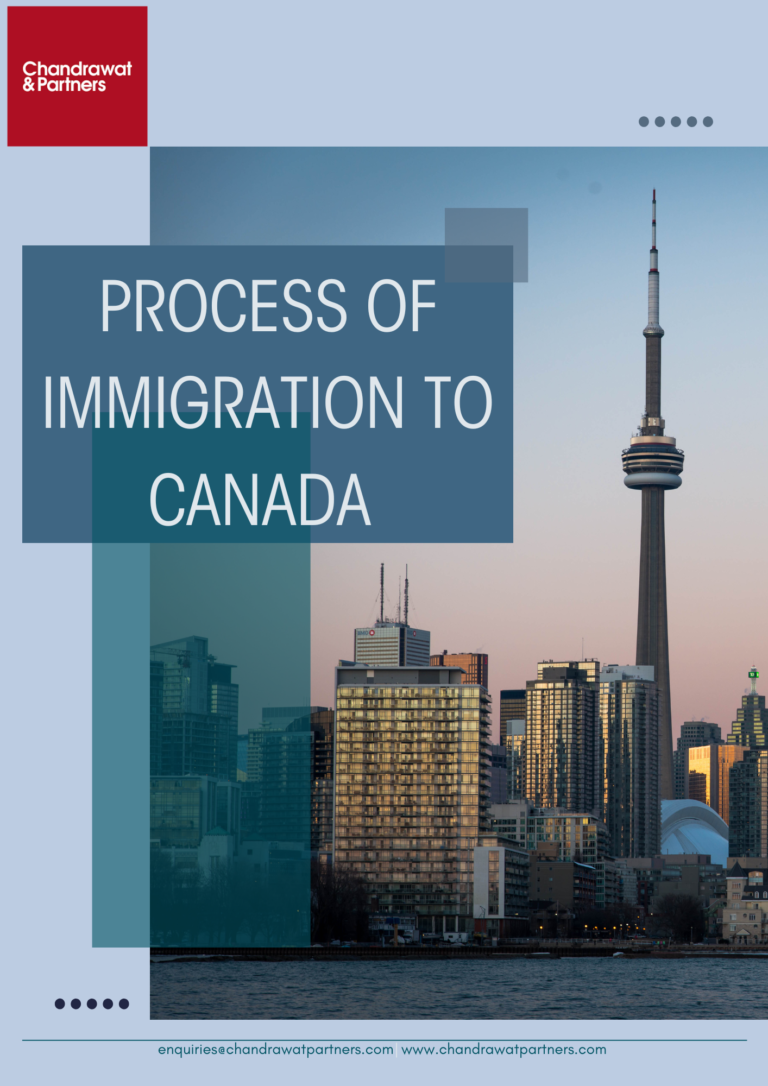We have a team of professionals to help you with all your business needs. So, that you can focus on business expansion in Canada.
Please feel free to email us on enquiries@chandrawatpartners.com
Canada
Why Canada?
Canada is a country in North America. Its ten provinces and three territories extend from the Atlantic Ocean to the Pacific Ocean and northward into the Arctic Ocean, covering over 9.98 million square kilometres (3.85 million square miles), making it the world’s second-largest country by total area. Divided into six time zones, Canada is the largest country in the Western Hemisphere. It is slightly larger than the US, and 18 times the size of France. Canada is the largest country of North America and the second largest country in the world. It has 13 sub national divisions, ten provinces, and three territories with each province having its own system of local government. The country is among the world’s wealthiest nations, moreover, the backbone of country’s economy is the service industry, which employs about three quarters of the country’s workforce. Wood and oil industry as well as the manufacturing industry with its automobile and aircraft are the other important economic sectors of the country. Canada is a member of the Organization for Economic Cooperation and Development (OECD) and the Group of Seven (G7).
Advantages
Having United States’ just to its north, makes the idea of doing business in Canada attractive for investors. The followings are the top benefits for choosing Canada as an international expansion destination.
Lower corporate taxes
Because of the highest corporate tax rates in their native countries, foreign business owners and entrepreneurs wish to enter into the Canadian market. As the country maintains lowest tax rates, it becomes an attractive destination to foreign investors and business owners.
A stable economy
A member of both the Organization for Economic Cooperation and the Group of Seven, Canada’s is considered one of the most stable economies in the world. As per the Forbes’ Best Countries for Business list, the country holds the first place. In comparison to a countries such as the US, Canada has a reasonable stable economy, which prevents from the risks of business shutdowns. Moreover, some of the main reasons for this economic stability are low tax rates, freedom to do trade and the well managed bureaucracy.
Skilled workforce
Having top ranking universities and quality institutes for vocational training, Canada has a high accessibility to skilled people in the workforce. If anyone planning to do business in Canada, finding out the skilled workers would be an easy task.
Connection with world
- Bounded by three oceans and traversing six time zones, Canada is the second largest country on earth.
- For business owners, it is good to know that Canada has over 550 port facilities.
- There are 18 best airports in Canada, wherein, Toronto is one of the most active airports in Canada.
A great place to live
Canada is amongst one of the most liveable countries in the world. It offers a clean environment, modern infrastructure and a desirable quality of life. Moreover, the people have the freedom to choose their desired employments.
Simple Tax Regime
Individual tax
The resident individual is liable to Canadian income tax on worldwide income. However, the relief from double taxation is provided through Canada’s international tax treaties, as well as via foreign tax credits and deductions for foreign taxes paid on income derived from non Canadian sources.
Non resident individual is liable to Canadian income tax on income from employment, income from carrying on a business and capital gains from the disposition of taxable Canadian property. However the following individual tax rates are applicable in Canada:
- Income from CAD 0 to 49,020 is liable to tax at a rate of 15%;
- Income from CAD 49,020 to 98,040 is liable to tax at a rate of 20.5%;
- Income from CAD 98,040 to 151,978 is liable to tax at a rate of 26%;
- Income from CAD 151, 978 to 216,511 is liable to tax at a rate of 29%; and
- Income over CAD 216,511 is liable to tax at a rate of 33%.
Corporate tax
Resident corporation in Canada is liable to corporate income tax (CIT) on their worldwide income, whereas, non residents corporation is liable to CIT on income derived from carrying on a business in Canada and also on capital gains arising upon the disposition of taxable Canadian property.
Canadian Companies
Entrepreneurs advancing business ideas in the Canadian market should, first of all, choose the most suitable type of business entity as per their needs. In Canada, following types of businesses are most commonly preferred:
Limited liability company
Generally, this form of company is found in European countries, which is why foreign investors might be tempted to ask for the incorporation of such a business form. However, in Canada, the limited liability company is regarded as an unincorporated entity with the benefits of the corporation.
The LLC is a hybrid between the sole trader and the partnership, but it offers limited liability to the shareholders.
Canadian extra provincial corporation
The extra provincial corporation is a popular business form, employed by foreign investors coming to Canada. The particularity of the extra provincial corporation resides in the fact that it needs to obtain a license in each province it operates and also requires a registered agent.
The public company
The public company is usually set up for completing large projects in Canada; however, its most important feature is that it can trade its shares to the general public. Through this way, the company can easily and quickly raise capital.
However, a Canadian corporation can become a public company, once it meets the requirements of the income tax laws of the country.
Sole proprietorship
As the name suggests this type of company is owned and controlled by a single person, moreover, such business is subject to lower startup costs and paperwork compared to the company structures mentioned above. A sole proprietor is in charge of the business management, responsibilities, and debts.
Partnership
This type of entity is similar to the sole proprietorship except there are two or more owners running the business together and sharing profits. Mainly there are two types of partnership available in Canada:
Limited partnership
The entrepreneurs will agree on the responsibilities and rights of each partner. However, the extent of profit share and liability might vary, but all the details are mentioned in the agreement.
- General partnership
In general partnership, each individual can manage the business, and he/she is responsible for the debts and obligations of the partnership.
Cooperative Company
A cooperative is a legally incorporated corporation that is owned by an association of persons seeking to satisfy common needs such as access to products or services, sale of their products or services, or employment. In Canada, a cooperative must incorporate under a specific cooperative Act at the provincial, territorial or federal level.
Branch Office
The branch office is an extension of a local or foreign company in Canada. It is also known as a satellite company as it will be completely dependent on the parent company. Mainly, the foreign parent carries full liability for the branch operations.
Subsidiary Company
Subsidiary company in Canada can be incorporated and subsequently operate under federal, territorial or provincial company laws. However, the Canadian Corporation Act governs legislation for the incorporation and maintenance of a subsidiary company.
The country is among the world’s wealthiest nations, moreover, the backbone of country’s economy is the service industry, which employs about three quarters of the country’s workforce. Wood and oil industry as well as the manufacturing industry with its automobile and aircraft are the other important economic sectors of the country. Canada is a member of the Organization for Economic Cooperation and Development (OECD) and the Group of Seven (G7).
Author: Chandrawat & Partners
Topic: Doing Business in Canada
Contact Us
Get in touch with the right people to get the right help in setting up your business in Canada.
Contact us at: enquiries@chandrawatpartners.com
Canada
We have a team of professionals to help you with all your business needs. So, that you can focus on business expansion in Canada.
WHY CANADA?
Canada is a country in North America. Its ten provinces and three territories extend from the Atlantic Ocean to the Pacific Ocean and northward into the Arctic Ocean, covering over 9.98 million square kilometres (3.85 million square miles), making it the world's second-largest country by total area. Divided into six time zones, Canada is the largest country in the Western Hemisphere. It is slightly larger than the US, and 18 times the size of France. Canada is the largest country of North America and the second largest country in the world. It has 13 sub national divisions, ten provinces, and three territories with each province having its own system of local government.
The country is among the world’s wealthiest nations, moreover, the backbone of country’s economy is the service industry, which employs about three quarters of the country’s workforce. Wood and oil industry as well as the manufacturing industry with its automobile and aircraft are the other important economic sectors of the country. Canada is a member of the Organization for Economic Cooperation and Development (OECD) and the Group of Seven (G7).

ADVANTAGES
Entrepreneurs advancing business ideas in the Canadian market should, first of all, choose the most suitable type of business entity as per their needs. In Canada, following types of businesses are most commonly preferred:
Lower corporate taxes
Because of the highest corporate tax rates in their native countries, foreign business owners and entrepreneurs wish to enter into the Canadian market. As the country maintains lowest tax rates, it becomes an attractive destination to foreign investors and business owners.
A stable economy
A member of both the Organization for Economic Cooperation and the Group of Seven, Canada's is considered one of the most stable economies in the world. As per the Forbes’ Best Countries for Business list, the country holds the first place. In comparison to a countries such as the US, Canada has a reasonable stable economy, which prevents from the risks of business shutdowns. Moreover, some of the main reasons for this economic stability are low tax rates, freedom to do trade and the well managed bureaucracy.
Skilled workforce
Having top ranking universities and quality institutes for vocational training, Canada has a high accessibility to skilled people in the workforce. If anyone planning to do business in Canada, finding out the skilled workers would be an easy task.
Connection with world
- Bounded by three oceans and traversing six time zones, Canada is the second largest country on earth.
- For business owners, it is good to know that Canada has over 550 port facilities.
- There are 18 best airports in Canada, wherein, Toronto is one of the most active airports in Canada.
A great place to live
Canada is amongst one of the most liveable countries in the world. It offers a clean environment, modern infrastructure and a desirable quality of life. Moreover, the people have the freedom to choose their desired employments.
SIMPLE TAX REGIME
Individual tax
The resident individual is liable to Canadian income tax on worldwide income. However, the relief from double taxation is provided through Canada’s international tax treaties, as well as via foreign tax credits and deductions for foreign taxes paid on income derived from non Canadian sources.
Non resident individual is liable to Canadian income tax on income from employment, income from carrying on a business and capital gains from the disposition of taxable Canadian property. However the following individual tax rates are applicable in Canada:
- Income from CAD 0 to 49,020 is liable to tax at a rate of 15%;
- Income from CAD 49,020 to 98,040 is liable to tax at a rate of 20.5%;
- Income from CAD 98,040 to 151,978 is liable to tax at a rate of 26%;
- Income from CAD 151, 978 to 216,511 is liable to tax at a rate of 29%; and
- Income over CAD 216,511 is liable to tax at a rate of 33%.
Corporate Tax
Resident corporation in Canada is liable to corporate income tax (CIT) on their worldwide income, whereas, non residents corporation is liable to CIT on income derived from carrying on a business in Canada and also on capital gains arising upon the disposition of taxable Canadian property.

CANADIAN COMPANIES
Entrepreneurs advancing business ideas in the Canadian market should, first of all, choose the most suitable type of business entity as per their needs. In Canada, following types of businesses are most commonly preferred:
Limited liability company
Generally, this form of company is found in European countries, which is why foreign investors might be tempted to ask for the incorporation of such a business form. However, in Canada, the limited liability company is regarded as an unincorporated entity with the benefits of the corporation.
Canadian extra provincial corporation
The extra provincial corporation is a popular business form, employed by foreign investors coming to Canada. The particularity of the extra provincial corporation resides in the fact that it needs to obtain a license in each province it operates and also requires a registered agent.
The public company
The public company is usually set up for completing large projects in Canada; however, its most important feature is that it can trade its shares to the general public. Through this way, the company can easily and quickly raise capital.
However, a Canadian corporation can become a public company, once it meets the requirements of the income tax laws of the country.
Sole proprietorship
As the name suggests this type of company is owned and controlled by a single person, moreover, such business is subject to lower startup costs and paperwork compared to the company structures mentioned above. A sole proprietor is in charge of the business management, responsibilities, and debts.

Partnership
This type of entity is similar to the sole proprietorship except there are two or more owners running the business together and sharing profits. Mainly there are two types of partnership available in Canada:
Limited partnership
The entrepreneurs will agree on the responsibilities and rights of each partner. However, the extent of profit share and liability might vary, but all the details are mentioned in the agreement.
- General partnership
In general partnership, each individual can manage the business, and he/she is responsible for the debts and obligations of the partnership

Related blogs
The country is among the world's wealthiest nations, moreover, the backbone of country's economy is the service industry, which employs about three quarters of the country's workforce. Wood and oil industry as well as the manufacturing industry with its automobile and aircraft are the other important economic sectors of the country. Canada is a member of the Organization for Economic Cooperation and Development (OECD) and the Group of Seven (G7).
Author: Chandrawat & Partners
Topic: Doing Business in Canada
To know more, download our Booklet "Process of Immigration to Canada" by clicking the link below
Contact Us
Get in touch with the right people to get the right help in setting up your business in Canada.
enquiries@chandrawatpartners.com.







